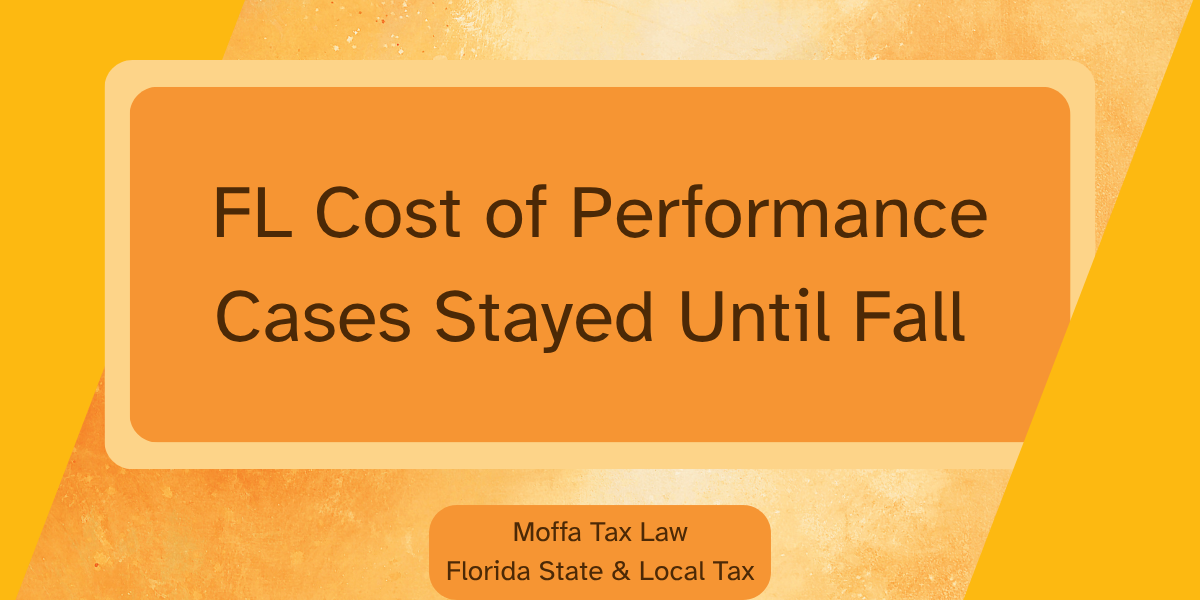NEWS & INSIGHTS


Florida Corporate Income Tax Lawsuits Quiet Through Fall as COP Cases Put on Hold
Florida’s most closely watched corporate income tax apportionment cases are now on pause until fall 2025. Lawsuits by Apple, BillMatrix, and CheckFree—each contesting how the Florida Department of Revenue (DOR) sources service revenue under the cost-of-performance (COP) rule—have all been formally stayed through September 15, 2025. With court activity frozen and interest waived in at least two of the cases, stakeholders are left waiting for developments expected later this year.
What Is Florida’s Cost-of-Performance (COP) Rule?
Florida uses an apportionment formula to determine how much of a multistate corporation’s income is taxable in the state. For service businesses, Rule 12C-1.0155(2)(l), Florida Administrative Code, requires that sales be sourced to Florida only if the income-producing activity is conducted primarily in Florida, based on where the costs are incurred.
This is known as the “cost-of-performance” (COP) method. It stands in contrast to “market-based sourcing,” where states tax revenue based on the location of the customer. While Florida has not formally adopted market-based sourcing, many taxpayers argue that DOR effectively applies it in audits, especially when dealing with remote or digital services.
The resulting tension has led to multiple lawsuits in which companies claim Florida is improperly taxing revenue from out-of-state activities, in violation of its own rules and constitutional standards.
Which Cases Are Stayed?
Apple Inc. v. Florida Department of Revenue
Case No.: 2024-CA-001111
Apple challenges a $14.8 million corporate income tax assessment (plus $2.3 million in interest) related to digital services such as iTunes, App Store, iCloud, and Apple Music. Apple argues that the income-producing activities for these services occur primarily outside of Florida, and that the Department’s use of customer location to source the revenue violates Florida’s COP rule.
The court entered a stay through September 15, 2025. Interest has been waived during the stay period, and a case management conference is expected this fall.
BillMatrix Corporation v. Florida Department of Revenue
Case No.: 2024-CA-001484
BillMatrix, a Fiserv subsidiary, provides electronic payment processing services. The Department issued a relatively small tax assessment (just over $43,000) but used the “interactive database” sourcing provision to assign revenue to Florida. BillMatrix contends that its services do not fit this provision and that the income should be sourced using the standard COP rule. Like Apple, BillMatrix’s case is stayed through September 15, 2025, with interest paused.
CheckFree Services Corporation v. Florida Department of Revenue
Case No.: 2024-CA-001026
CheckFree, another Fiserv entity, is disputing an assessment of approximately $3.39 million (including interest) for tax years 2018–2020. CheckFree’s bill payment services are performed primarily outside of Florida, and the company argues that applying market-based sourcing is both incorrect and unconstitutional. This case is also stayed through September 15, 2025.
In addition to these three, there are likely other COP cases which are or will be stayed as well.
Why These Cases Matter
Florida’s sourcing rule is a major issue for multistate taxpayers, especially those in digital or service-based industries. The lawsuits raise several key concerns:
- Regulatory conflict: Florida has a published COP rule, but DOR is often accused of applying market-based sourcing in practice.
- Audit implications: Many companies are facing assessments based on customer location rather than the location of operations.
- Refund potential: A win for any of these taxpayers could open the door to significant refund claims from other similarly situated businesses.
- Constitutional questions: Some plaintiffs raise due process and commerce clause claims based on taxation of out-of-state activity.
Audit Practice vs. the Rule: A Growing Divide
While Florida’s COP rule remains on the books, the Department’s audit approach has drifted toward a market-based method. This gap has placed taxpayers in a precarious position: comply with the written rule and risk audit adjustments, or follow audit trends and risk later challenges or penalties.
These lawsuits could determine whether the Department’s evolving sourcing practices hold up in court—or whether Florida will be forced to more clearly align policy with published law.
What Should Taxpayers Be Doing Now?
- Review your Florida sales factor sourcing for services from prior tax years.
- Consider whether to file protective refund claims if your company used COP sourcing and was later audited under a market-based theory.
- Monitor the outcomes of these cases for precedent-setting decisions or settlement frameworks.
- Document your cost-of-performance calculations and service delivery structures in the event of future audit scrutiny.
No Updates Expected Until Fall 2025
With all three cases stayed through September 15, 2025, no further activity—motions, discovery, or hearings—is expected in the meantime. Each case will reconvene in the fall with a new case management conference, at which point litigation or resolution may resume.
For now, Florida’s cost-of-performance controversy remains unresolved—but not forgotten.
Moffa Tax Law | Florida State and Local Tax Attorneys
© 2025 Jeanette Moffa. All Rights Reserved.
It’s a sourcing rule that attributes service revenue to Florida only if the income-producing activity occurs primarily in the state, based on where the costs are incurred.
They argue the Department is improperly sourcing revenue based on customer location instead of following the COP rule, resulting in over-taxation.
Technology, financial services, digital platforms, SaaS, and remote service providers are most exposed to sourcing conflicts in Florida.
Yes, but all three are formally stayed through September 15, 2025. No updates are expected until fall.
Potentially. A favorable ruling could open the door to similar refund claims from other multistate service providers.
It’s a provision that sources revenue to Florida when customers use or access a database hosted by the seller. Some companies argue it’s being misapplied.
As of now, Florida has not enacted legislation to shift away from COP sourcing, but audit practices often resemble a market-based approach.
They should monitor litigation developments, review their sourcing methodology, and consider protective refund claims if relevant.
Yes, courts have previously ruled in favor of taxpayers on COP issues, including in the 2022 BillMatrix and Target cases.
Read Moffa Tax Law’s earlier article on Florida COP Apportionment: https://moffataxlaw.com/florida-cost-of-performance-cop-apportionment-what-is-going-on/
Share
Additional Articles by the SALTy Orange at Moffa Tax Law:
NEWS & INSIGHTS Florida Corporate Income Tax Lawsuits Quiet Through Fall as COP Cases Put on Hold …
Florida Communications Services Tax: Expanded Scope, Recent Guidance, and Compliance Risks
NEWS & INSIGHTS Florida Communications Services Tax: Expanded Scope, Recent Guidance, and Compliance Risks Florida Communications Services Tax: Expanded Scope,…
Florida Repeals Sales Tax on Commercial Rent — Will DeSantis Sign the Landmark 2025 Tax Cut?
NEWS & INSIGHTS Florida Repeals Sales Tax on Commercial Rent — Will DeSantis Sign the Landmark 2025 Tax Cut? …

Jeanette Moffa, Esq.
(954) 800-4138
JeanetteMoffa@MoffaTaxLaw.com
Jeanette Moffa is a Partner in the Fort Lauderdale office of Moffa, Sutton, & Donnini. She focuses her practice in Florida state and local tax. Jeanette provides SALT planning and consulting as part of her practice, addressing issues such as nexus and taxability, including exemptions, inclusions, and exclusions of transactions from the tax base. In addition, she handles tax controversy, working with state and local agencies in resolution of assessment and refund cases. She also litigates state and local tax and administrative law issues.


